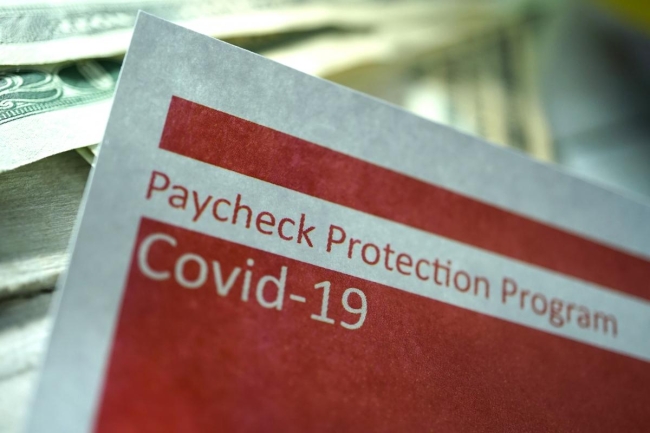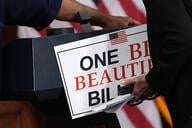You have /5 articles left.
Sign up for a free account or log in.

istock.com/kameleon007
Dozens of struggling higher education associations have been awarded tens of millions of dollars in forgivable loans as part of a $660 billion government relief package designed to prevent layoffs at small businesses due to the COVID-19 pandemic.
Between $20.35 million and $45.85 million in forgivable loans were approved to retain more than 1,200 jobs at 38 national higher education associations, according to an analysis by Inside Higher Ed that examined a selection of major associations receiving loans valued at more than $150,000.
The American Council on Education, a leading higher education membership group and influence on education policy, secured a PPP loan of between $2 million and $5 million -- one of the largest amounts so far awarded to a national higher education association, according to data published by the Small Business Administration Monday.
ACE was one of many organizations that suffered immediate financial losses due to the COVID-19 pandemic, said Jonathan Riskind, assistant vice president of public affairs at ACE, in an email. The organization lost revenue when it was forced to cancel its annual meeting in San Diego in mid-March, as well as other face-to-face events, said Riskind.
When higher education institutions struggle financially, it has a knock-on effect on the associations that represent them, creating great uncertainty, said Riskind. He noted that several national higher education associations are tenants of One Dupont Circle, a building owned by ACE.
ACE did not share the exact amount of funding it received but said it was at the "lower end" of the $2 to 5 million range. The funds have been used to cover allowable payroll costs and utility expenses, in accordance with compliance criteria for loan forgiveness, said Riskind.
Educause, a membership organization for higher ed IT professionals, was also approved for a large PPP loan. Federal data show the organization was approved for a loan of between $2 and 5 million. However, Educause said the reported figure is inaccurate. It received a loan of $1.7 million, and like ACE, expects to be in full compliance for forgiveness of the loan.
"As many have noted, the pandemic’s financial impact on institutions and the greater higher education community has been profound," said a statement from Educause shared by director of marketing Marc Stith. "As our association is made up of a strong community across the higher education technology ecosystem, we share in the financial challenges many of our members are experiencing."
Several associations secured PPP loans of between $1 million and $2 million, including the Association of Public and Land-grant Universities, the National Association for College Admission Counseling, and NAFSA, the association of international educators.
The analysis shown in the table above focuses on members of the Washington Higher Education Secretariat, a membership organization for the leaders of national higher education associations. Among WHES members, 38 out of 56 national associations secured PPP loans of more than $150,000.
Many other higher education associations, including regional groups, were also approved for the program. Hundreds of higher education institutions also qualified, most of which appear to be small private liberal arts colleges. To qualify for the PPP loans, organizations must have fewer than 500 employees, which may have excluded many larger colleges and universities from applying. To convert the loans to grants, participating organizations must meet forgiveness criteria laid out by the Small Business Administration. Several associations contacted by Inside Higher Ed said that it is their intention to meet the criteria for loan forgiveness so that they do not have to repay the funds.
The Small Business Administration reports that the majority of the PPP loans awarded were for amounts less than $150,000. However, the database on these loans does not include recipient names. It is possible that some higher education organizations may have secured PPP loans of less than $150,000. According to the Small Business Administration website, employers applying for loans were required to show that the money was necessary to support their ongoing operations while taking into account “their ability to access other sources of liquidity.”
For higher education associations, many of which have been hit hard financially by the pandemic, the PPP loans are a welcome relief, said Henry Stoever, president and CEO of the Association of Governing Boards of Colleges and Universities.
AGB would usually generate about 20 percent of its revenue from in-person events and conferences, said Stoever. Online events bring in less revenue, but they allow greater participation, he said. Double the usual number of attendees participated in AGB's recent annual conference online. AGB has committed to holding all events online for the next year in the interest of safety, regardless of whether federal and state regulations would allow for in-person events -- something few associations have publicly committed to do, Stoever said.
Without the PPP, it would be difficult for AGB to continue its “essential role” in supporting institutions through their own financial difficulties, said Stoever. The association secured a loan of between $1 million and $2 million, which will help to retain and fund the salaries of 43 employees, according to federal data.
Colleges and universities need guidance from associations at this challenging moment in time, said Stoever. As colleges' board members and presidents make plans for the upcoming academic year, AGB has been encouraging its members not just to consider the financial health of their institutions and student success, but also to prioritize the health and safety of their students, faculty and staff.
The National Association of College and University Business Officers, also a member of WHES, published a statement in mid-June outlining the financial challenges the association is facing, as well as highlighting the resources NACUBO created to help higher ed business officers navigate the financial challenges presented by the pandemic.
“Like so many of our member colleges and universities and our business partners, NACUBO has experienced financial losses brought on by changes in the U.S. economy and by the particularly adverse impacts the pandemic has had on higher education broadly,” wrote Susan Whealler Johnston, president and CEO of NACUBO, in the June statement. “NACUBO’s leadership team and board of directors are committed to striking a balance between the immediate needs and longer-term goals of the organization. As a result, we have taken a hard look at our budget and are implementing many of the same strategies our members are employing to weather the crisis, including staff layoffs and salary reductions.”
NACUBO secured a PPP loan of between $1 million and $2 million, which will be used to retain 52 jobs, according to the SBA data. In an email, Johnston shared that similar to AGB and others, conferences and events were a major source of income for NACUBO.
“NACUBO canceled many of its signature programs this year, including its annual meeting, which usually attracts several thousand attendees,” said Johnston. “Revenue from our annual meeting, as well as other smaller conferences, is a sizable element of NACUBO’s operating budget. We also anticipate that our members and business partners will face unforeseen limitations in their financial ability to support our work.”
While the PPP loan has helped NACUBO to continue its work, it was “not enough for NACUBO to maintain its previous operating capacity beyond the period covered by the loan,” said Johnston. Despite some staff cuts, the organization still hopes to meet the qualifications to convert the PPP loan to a grant, she said.
The Association of Catholic Colleges and Universities, a member of the Washington Higher Education Secretariat, received a PPP loan of between $350,000 and $1 million. “The PPP program was very helpful to the ACCU,” said Paula Moore, vice president of external affairs for the association, in an email. “The pandemic reduced our income from four revenue streams -- membership dues, conference registrations, consulting, and meeting sponsorships.”
It's difficult to know the full extent of lost income since the pandemic is ongoing, Moore said.
“But that one-time assistance did enable us to keep our staff employed, and we’re grateful for that,” she said.




